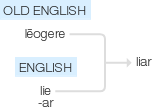Liar
Old English lēogere (see lie2, -ar4).
wiktionary
From Middle English lier, liere, lyere, liȝer, lieȝer, legher, from Old English lēgere, lēogere(“liar, false witness, hypocrite”), from Old English lēogan(“to lie, deceive, belie, betray, be in error, charge falsely”), equivalent to lie + -er. Cognate with Old High German liogāri, liugāri("liar"; > Middle High German liegære, lieger(“liar”) > archaic German Lüger(“liar”)), Old Norse ljúgari("liar"; > Icelandic lygari(“liar”)). Compare also German Lügner(“liar”), Swedish lögnare(“liar”). More at lie.
etymonline
liar (n.)
"one who knowingly utters falsehoods," early 13c., from Old English leogere "liar, false witness, hypocrite," agent noun from Anglian legan, West Saxon leogan "be untruthful, lie" (see lie (v.1)). "The form in -ar is probably in imitation of the refashioned forms such as scholar for scoler and pillar for piler" [Barnhart]. A different formation yielded Dutch leugenaar, Old High German luginari, German Lügner, Danish lögner.
